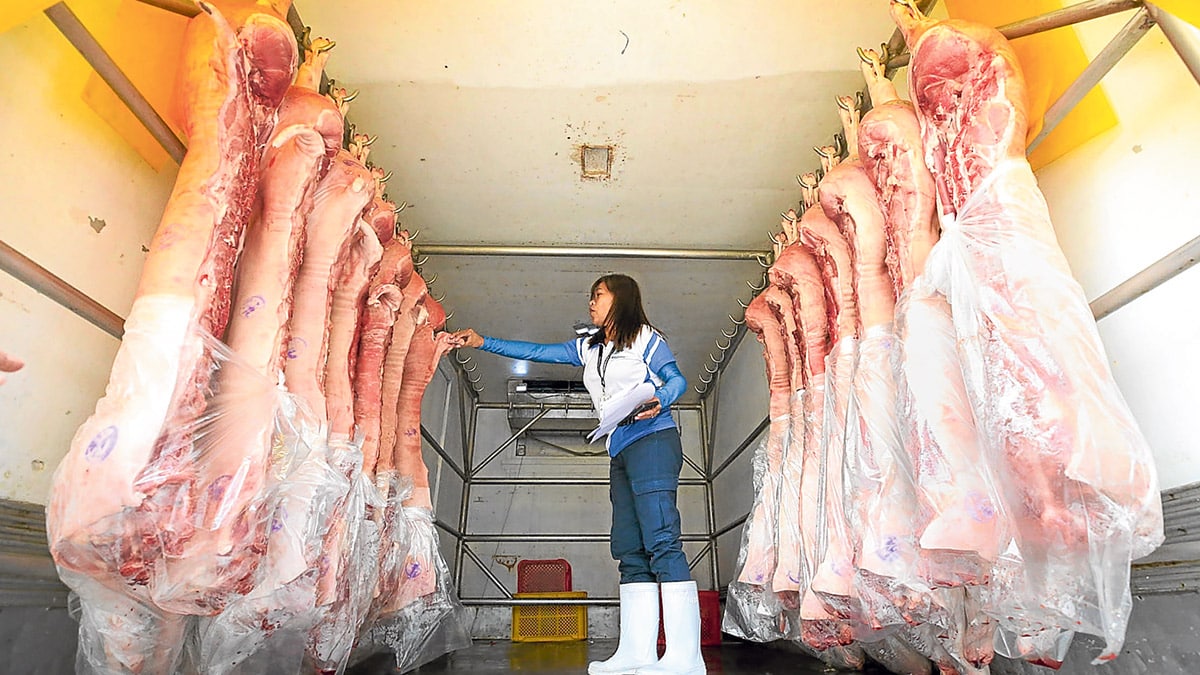PH buys more pork overseas amid swine flu, El Niño

PRECAUTION An officer from the meat inspection office of Marikina City inspects freshly slaughtered carcass inside a delivery van in this Aug. 15 photo. —LYN RILLON
The resurgence of African swine fever (ASF) in certain parts of the Philippines, coupled with the El Niño phenomenon, pushed the volume of imported pork in the country up by almost 10 percent in the first half of the year.
Meat imports totaled 647.75 million kilograms (kg) in the first semester of 2024, an increase of 9.6 percent from 590.77 million kg in the same period a year ago, data from the Bureau of Animal Industry (BAI) showed.
The first-semester meat imports represent 53.8 percent of last year’s volume of 1.2 billion kg.
READ: 4 firms eye contract to supply PH with ASF vaccines
The volume had been rising from February to May before declining in end-June, around the time President Marcos retained lower import duties on agricultural commodities.
Article continues after this advertisement“The reduction in supply caused by the continuing effects of ASF coupled with El Niño most likely encouraged importers to bring in more products,” Meat Importers and Traders Association president emeritus Jesus Cham said in a Viber message over the weekend.
Article continues after this advertisementPork remained the leading meat product purchased by traders but Cham said beef showed the highest increase of nearly 30 percent.
Pork accounted for 48.9 percent of the total with 317 million kg, climbing by 7.6 percent from a year prior. Importers primarily brought in offals and pork cuts.
Cham noted that pork cuts registered a higher increase compared to bellies. “At the same time, it appears that there is more demand for cheaper cuts, offal and by-products,” he said.
Chicken came second totaling 221.6 million kg, up by 4.1 percent. It cornered 34.2 percent of the six-month total, mainly consisting of mechanically deboned meat or mechanically separated chicken.
READ: Truck with 11 pigs positive for ASF caught in Valenzuela
Beef rose by 29.2 percent to end at 84.92 billion kg, equivalent to an import share of 13.1 percent. Beef cuts took up more than half of the overall volume.
“The record high domestic retail prices of pork and chicken indicate a severe supply shortage. This has allowed beef to become more competitive,” he added.
Meat traders procured 23.1 million kg of buffalo along with turkey, lamb and duck during the reference period.
Among meat exporting countries, Brazil was still the leading source of imported meat in the archipelago after shipping 223.64 million kg of the commodity, mainly chicken and pork.
Brazilian exporters had expressed their readiness to deliver more pork and chicken, especially after gaining expanded access to the Philippine market in March.
The Philippines and Brazil had reached the system accreditation and prelisting establishment agreement, allowing the latter’s exporters to supply meat as long as they are duly registered and authorized. Philippine authorities will no longer individually evaluate applications from Brazil.
The United States and Spain followed with 95.1 million kg and Spain with 81.3 million kg.
Cham said the issuance of Executive Order No. 62, which aims to ensure continued supply of essential food products at affordable prices by keeping tariff rates on various products low, provided certainty to importers.
However, he said the Department of Agriculture “still appears unwilling to recognize the supply shortage.”
“The pork MAV (minimum access volume or the tariff quota) was only fully issued this week, delayed by over 6 months,” he added.
Cham also said the DA would reclassify certain pork offal as meat for it to pay higher duty and landed costs. —Jordeene B. Lagare INQ